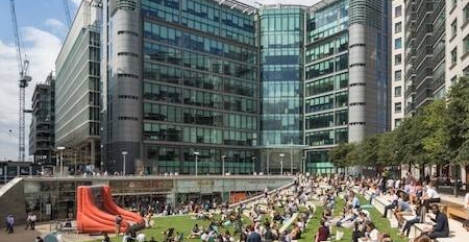September 19, 2018
Better urban design could improve the lives and wellbeing of millions of people
 Adjusting the planning system to put good design at the heart of urban development could lead to a £15 billion boost to the UK economy and improve the wellbeing and mental health of millions of individuals across the UK. The new report, A Design for Life, commissioned by British Land says that improving mental health and wellbeing in our cities could have significant and positive impacts in several ways, including boosting productivity in the workplace, reducing absenteeism and bringing down the NHS and welfare bills.
Adjusting the planning system to put good design at the heart of urban development could lead to a £15 billion boost to the UK economy and improve the wellbeing and mental health of millions of individuals across the UK. The new report, A Design for Life, commissioned by British Land says that improving mental health and wellbeing in our cities could have significant and positive impacts in several ways, including boosting productivity in the workplace, reducing absenteeism and bringing down the NHS and welfare bills.
The Paper cites figures from the Centre for Urban Design & Mental Health which reveal the particular mental health challenge in our cities. That study found that urban dwellers have an almost 40 percent higher risk of depression, over 20 percent more anxiety, and double the risk of schizophrenia, in addition to more loneliness, isolation and stress. The new report identifies that well designed environments have a material positive impact on mental health: with two-thirds of the UK population now living in urban environments, good design has the potential to improve the wellbeing of around 44 million people.
The report says that incentivising local areas to put good design at the heart of their regeneration plans – such as the inclusion of outdoor gyms, urban parks, and building design – could dramatically improve peoples’ physical health, wellbeing and mental health. The chief executive of British Land has urged the government to grasp this huge opportunity and leave a “legacy beyond Brexit.”
The paper, co-authored by a former Treasury economist, finds that putting health and wellbeing at the heart of development would lead to a £15.3bn boost to the economy by 2050:
- £3.6bn of savings from less reliance on the NHS and welfare bills
- £5.4bn productivity increase due to less people taking time off work for stress related issues
- £6.3bn boost in economic output from more people being in employment
The report sets out a distinct policy to help put health and wellbeing at the heart of urban development by enhancing the government’s existing Enterprise Zone policy. The private sector would be incentivised to put good design at the heart of their development plans. Under these ‘Urban Wellbeing Zones’, planning applications would be fast-tracked on the condition that proposed developments contribute to community resilience and wellbeing.













